Oracle database 11.2.0.x on Linux 64bit including the prerequisites in preparation for OIM (OFM) 11gR2 11.2.0.x
Pre-requisites packages
Before you can install Oracle Database, you need to install some packages which are essential prior to running the installation package. There's 19 packages that need to install which, if you've installed via RPM in the past can be a nightmare, though there's now a single package that can install all the other packages called oracle-rdbms-server-11gR2-preinstall
Dependency Installed:
libstdc++-devel-4.4.6-4.el6.x86_64
glibc-2.12-1.80.el6_3.6.x86_64
glibc-common-2.12-1.80.el6_3.6.x86_64
mpfr-2.4.1-6.el6.x86_64
cpp-4.4.6-4.el6.x86_64
compat-libcap1-1.10-1.x86_64
ksh-20100621-16.el6.x86_64
compat-libstdc++-33-3.2.3-69.el6.x86_64
ppl-0.10.2-11.el6.x86_64
cloog-ppl-0.15.7-1.2.el6.x86_64
kernel-uek-headers-2.6.32-300.39.1.el6uek.x86_64
glibc-headers-2.12-1.80.el6_3.6.x86_64
glibc-devel-2.12-1.80.el6_3.6.x86_64
gcc-4.4.6-4.el6.x86_64
gcc-c++-4.4.6-4.el6.x86_64
libaio-devel-0.3.107-10.el6.x86_64
oracle-rdbms-server-11gR2-preinstall-1.0-6.el6.x86_64
glibc-2.12-1.80.el6_3.5.x86_64
glibc-common-2.12-1.80.el6_3.5.x86_64
compat-libcap1-1.10-1.x86_64
ksh-20100621-16.el6.x86_64
glibc-common-2.12-1.80.el6_3.6.x86_64
gcc-4.4.6-4.el6.x86_64
libaio-devel-0.3.107-10.el6.x86_64
oracle-rdbms-server-11gR2-preinstall-1.0-6.el6.x86_64
gcc-c++-4.4.6-4.el6.x86_64
glibc-headers-2.12-1.80.el6_3.6.x86_64
libstdc++-devel-4.4.6-4.el6.x86_64
compat-libstdc++-33-3.2.3-69.el6.x86_64
glibc-2.12-1.80.el6_3.6.x86_64
mpfr-2.4.1-6.el6.x86_64
kernel-uek-headers-2.6.32-300.39.1.el6uek.x86_64
cpp-4.4.6-4.el6.x86_64
glibc-devel-2.12-1.80.el6_3.6.x86_64
ppl-0.10.2-11.el6.x86_64
cloog-ppl-0.15.7-1.2.el6.x86_64
glibc-2.12-1.80.el6_3.5.x86_64
glibc-common-2.12-1.80.el6_3.5.x86_64
cd /etc/yum.repos.d
rm /etc/yum.repos.d/*
yum clean all
su Enter Password
# yum install oracle-rdbms-server-11gR2-preinstall
Set Environment Variables
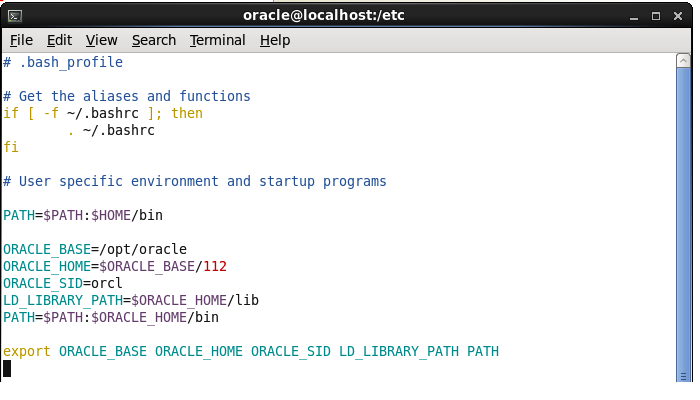
In this task, you are required to set the Oracle environment variable for both the installation and also based on a permanent basis. You need to edit /home/oracle/.bash_profile. To do this, execute the following:
vi /home/oracle/.bash_profile
Once you're in vi editor, include the following lines Note: you need to press 'a' to edit then 'esc' when you've finished editing
ORACLE_BASE=/opt/oracle
ORACLE_HOME=$ORACLE_BASE/112
ORACLE_SID=orcl
LD_LIBRARY_PATH=$ORACLE_HOME/lib
PATH=$PATH:$ORACLE_HOME/bin
export ORACLE_BASE ORACLE_HOME ORACLE_SID LD_LIBRARY_PATH PATH
Save and exit vi editor by pressing the following:
:wq!
For your efforts to take effect, enter in terminal the following command:
. /home/oracle/.bash_profile
To test your efforts were successful, test by typing in the following:
echo $ORACLE_HOME
You should get back the value you entered in the file. If the value is blank, then the variable has not been set correctly.
Modify 'opt' Directory
As part of the installation, you will need write access because you cannot install via root. A quick and dirty way would be to modify the 'opt' directory (which by default is 755)
sudo chmod 777 /opt/
Note: Providing full access to the opt directory is not recommended though I've decided to do this for the purpose of this demonstration. Also, make a new directory where you will be installing the Oracle Database.
mkdir /opt/oracle/
Start the Installation
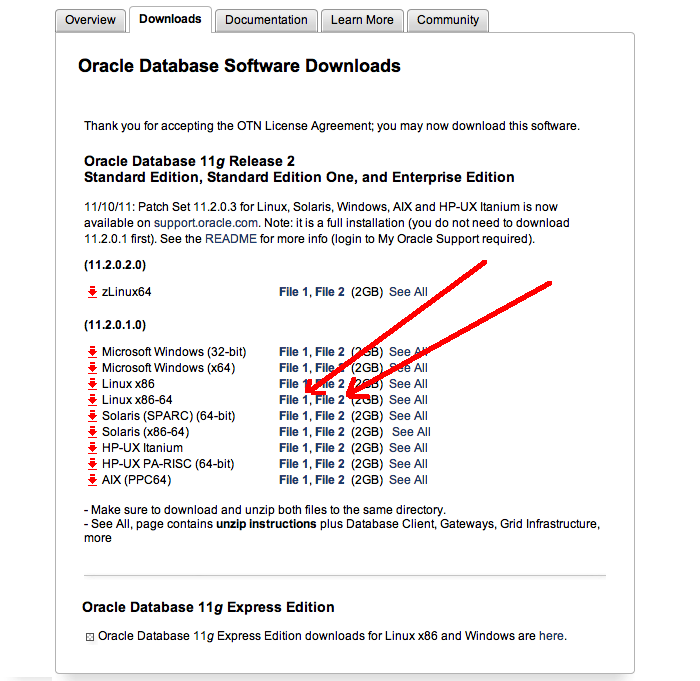
You need to download both files from the Oracle website, un-package them, then combined them both together.
Oracle Database Software Download Website
From your extracted packages, navigate to the 'runInstaller' file and enter in the following command:
./runInstaller
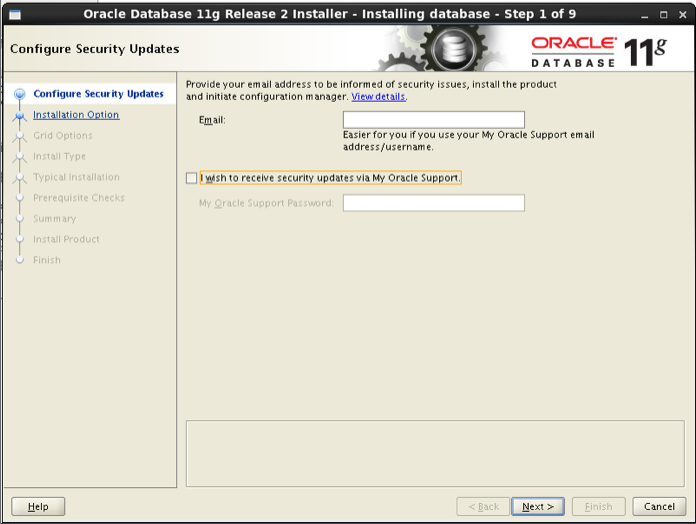
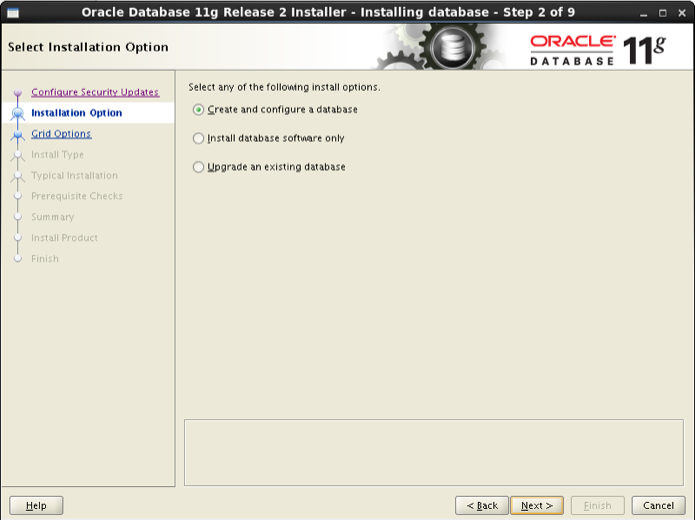
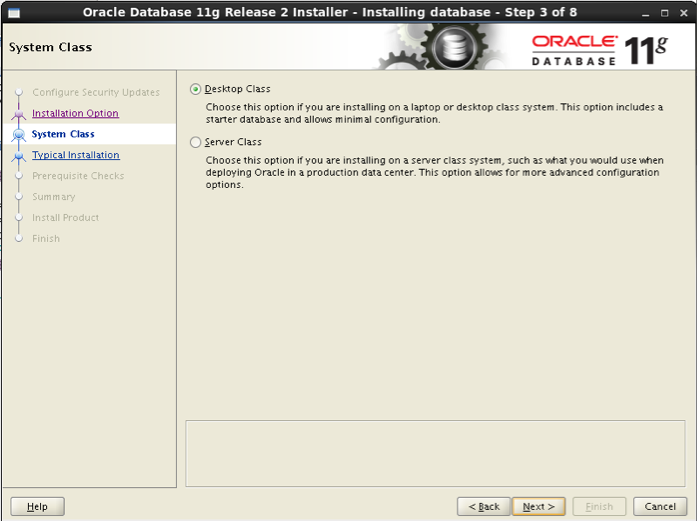
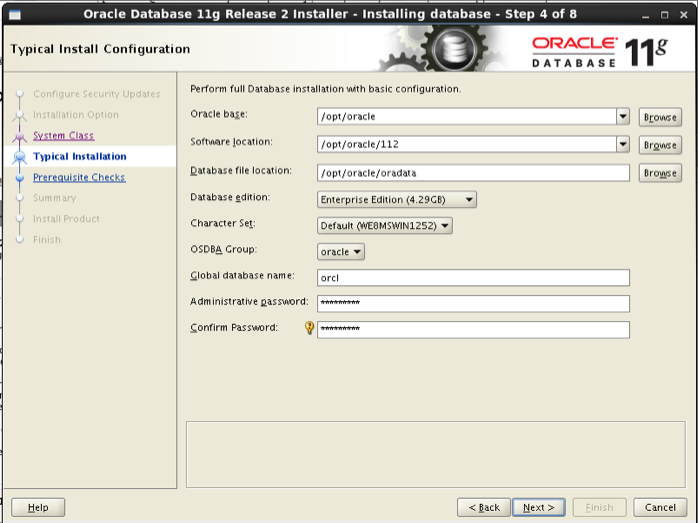
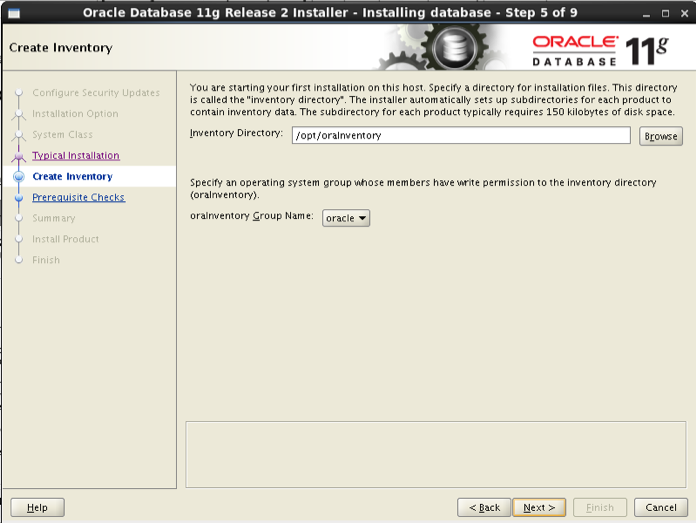
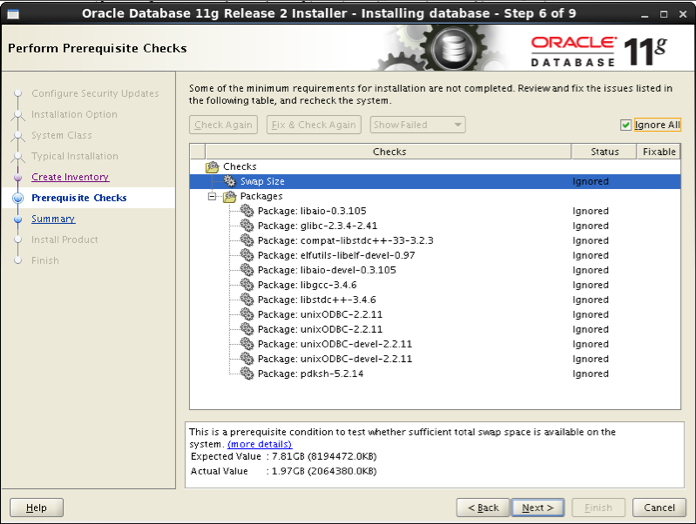
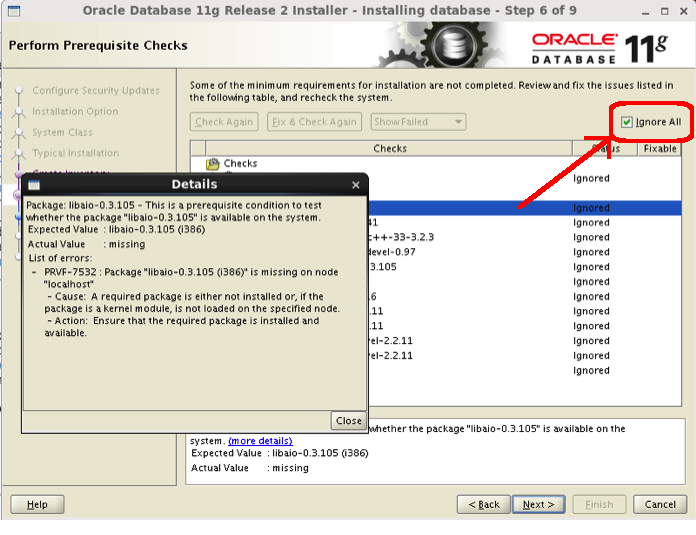
Important
You may notice that the minimum requirements fail during the testing.
Package:libaio-0.3.105 - This is a prerequisite condition to test whether the package "libaio-0.3.105 is available on the system. List of errors:
-
This is a little miss leading because I noticed that these are 32-bit packages, not the 64bit packages. You installed the 64bit packages because so go ahead and click 'ignore all'
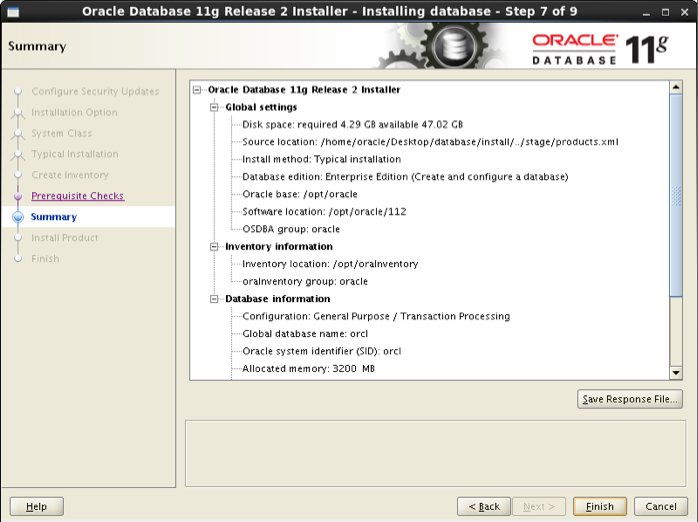
Password Management
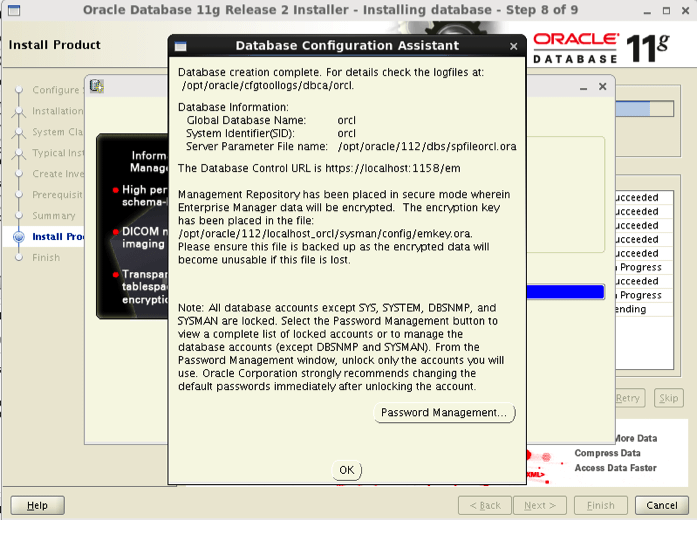
Click in on the button password management and add a password to the vital users. I activated all of them to avoid further complications with other functions later. Again, if this is a live environment, reconsider taking this option.
Execute configuration scripts
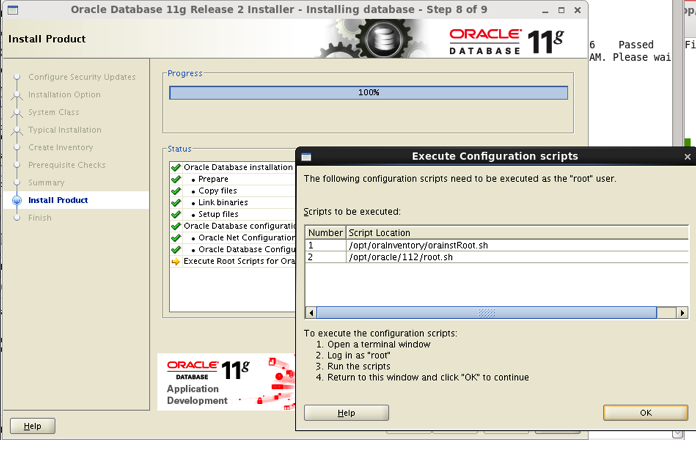
When you see this screen, you will be required to execute some shell scripts.
cd /opt/oraInventory/
./orainstRoot.sh
./root.sh
Once you've executed these scripts, carry on with the installation.
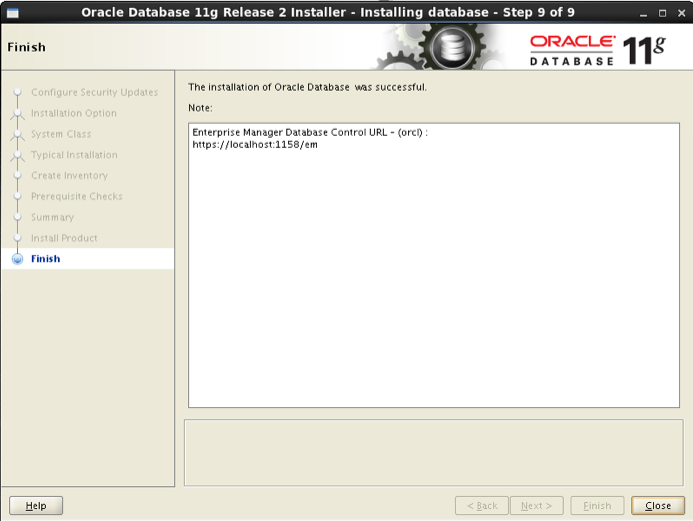
Testing Oracle Enterprise Manager
You should now be able to test Oracle enterprise manager by entering in the following URL:
http://localhost:1158/em
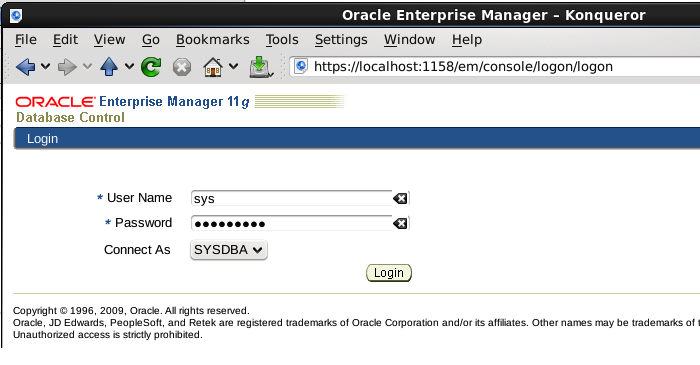
Enter in the credentials of sys that you activated in the password management.
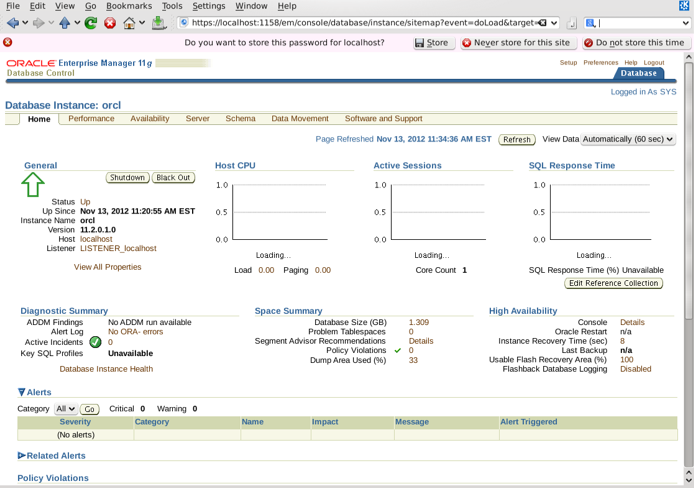
Next Chapter
Complete!
If you're following the OFM installation, go to the next blog:
HOW TO: Install Weblogic 10.3.6 for OIM 11gR2
About the author
 Daniel is a Technical Manager with over 10 years of consulting expertise in the Identity and Access Management space.
Daniel is a Technical Manager with over 10 years of consulting expertise in the Identity and Access Management space.Daniel has built from scratch this blog as well as technicalconfessions.com
Follow Daniel on twitter @nervouswiggles
Comments
Other Posts
AS I was migrating my environment into an S3 environment, I wanted to leverage off the SES services that AWS provide, more specifically, to leverage the off the SMTP functionality by sending an email via PHP
Read More...
The WeMos D1 is a ESP8266 WiFi based board is an extension to the current out-of-the-box library that comes with the Arduino installation. Because of this, you need to import in the libraries as well as acknowledging the specific board. This process is highly confusion with a number of different individuals talking about a number of different ways to integrate.
Read More...
NameID element must be present as part of the Subject in the Response message, please enable it in the IDP configuration.
Read More...
For what I see, there's not too many supportive documentations out there that will demonstrate how provision AD group membership with the ICF connector using OpenIDM. The use of the special ldapGroups attribute is not explained anywhere in the Integrators guides to to the date of this blog. This quick blog identifies the tasks required to provision AD group membership from OpenIDM to AD using the LDAP ICF connector. However this doesn't really explain what ldapGroups actually does and there's no real worked example of how to go from an Assignment to ldapGroups to an assigned group in AD. I wrote up a wiki article for my own reference: AD group memberships automatically to users This is just my view, others may disagree, but I think the implementation experience could be improved with some more documentation and a more detailed example here.
Read More...
In the past, the similar error occurred though for the Oracle Identity Management solution. invalidcredentialexception remote framework key is invalid Because they all share the ICF connector framework, the error/solution would be the same.
Read More...
org.forgerock.script.exception.ScriptCompilationException: missing ; before statement
Read More...
ForgeRock IDM - org.forgerock.script.exception.ScriptCompilationException: missing ; before statement
Read More...
When performing the attempt of a reconciliation from ForgeRock IDM to Active Directory, I would get the following error
Read More...
In the past, the similar error occurred though for the Oracle Identity Management solution. invalidcredentialexception remote framework key is invalid Because they all share the ICF connector framework, the error/solution would be the same.
Read More...
During the reconcilation from OpenIDM to the ICF google apps connector, the following error response would occur. ERROR Caused by com.google.api.client.auth.oauth2.TokenResponseException 400 Bad Request - invalid_grant
Read More...

